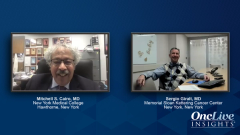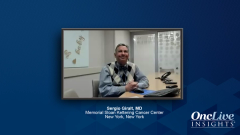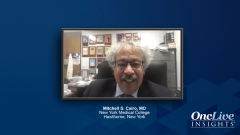
A Multidisciplinary Approach to Managing VOD
Sergio Giralt, MD, leads a discussion on the importance of a multidisciplinary team approach in caring for patients with VOD, from recognizing early signs to treating and monitoring the disease.
This is a synopsis of an Insights series featuring Mitchell S. Cairo, MD, of New York Medical College, and Sergio Giralt, MD, of Memorial Sloan Kettering Cancer Center.
Dr. Cairo emphasized that excellent multidisciplinary care is essential when diagnosing and managing transplant patients at risk for VOD. He asked Dr. Cairo to discuss the importance of a team-based approach.
Dr. Giralt responded that nurses and advanced practice providers are critical for safe care of the high transplant volume at his center. Key elements of multidisciplinary VOD care start with identifying high-risk patients so all clinicians have heightened vigilance. Nurses meticulously measure daily weights and intake/output to detect fluid retention early. Unexplained weight gain refractory to diuretics and sodium restriction warrants immediate action in a heavily pretreated patient. Radiology colleagues are essential for Doppler ultrasound diagnosis of VOD. Gastroenterology input helps exclude other potential causes of liver injury like graft-versus-host disease and infections. Even amoebic liver abscesses can mimic VOD. With high-risk patients, he advocates starting defibrotide at the earliest suggestion of VOD rather than waiting for overt disease.
Dr. Giralt agreed, highlighting the importance of ICU and nephrology colleagues particularly for patients with severe VOD and multiorgan failure. He noted that while excellent biomarkers are still lacking, serial ultrasound and Doppler assessments for portal flow slowing or ascites can prompt early defibrotide initiation in appropriate high-risk patients even before reversal of flow is seen. Close monitoring and a low threshold for treatment are key in patients at elevated baseline risk for VOD.
*Video synopsis is AI-generated and reviewed by OncLive editorial staff.










































